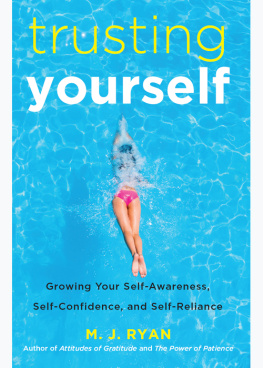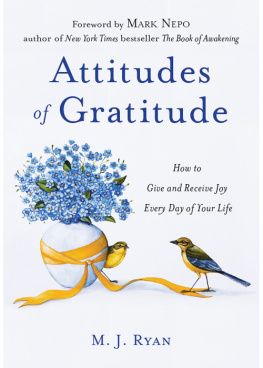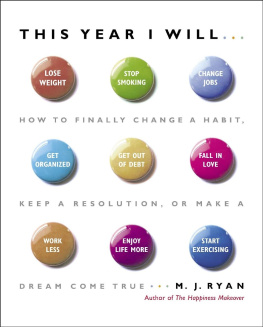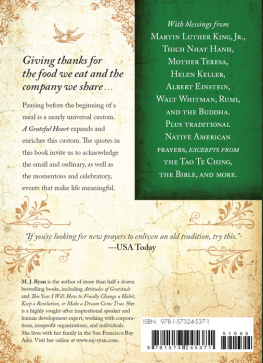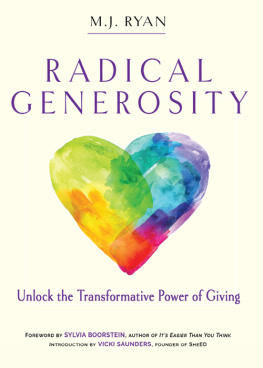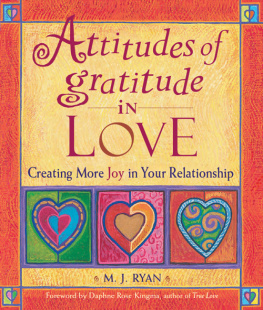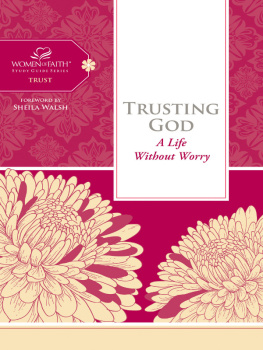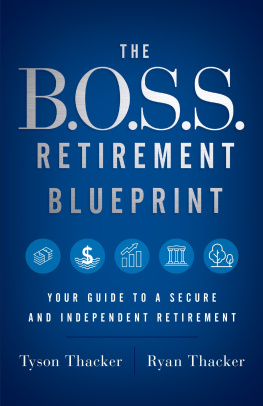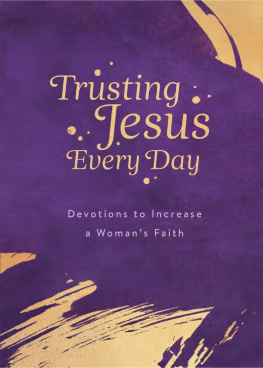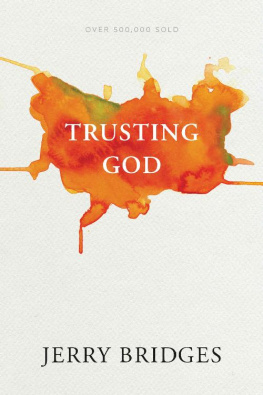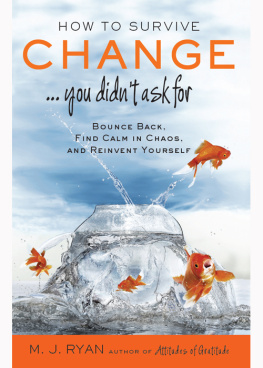Also by M. J. Ryan
365 Health and Happiness Boosters
A Grateful Heart
Attitudes of Gratitude
Attitudes of Gratitude in Love
How to Survive Change...You Didn't Ask for
The Fabric of the Future
The Giving Heart
The Happiness Makeover
The Power of Patience
As the editor of Conari Press
Christian Acts of Kindness
Kids' Random Acts of Kindness
More Random Acts of Kindness
Random Acts of Kindness
Random Acts of Kindness Then and Now
The Community of Kindness
The Practice of Kindness

This edition first published in 2015 by Conari Press
an imprint of Red Wheel/Weiser, LLC
With offices at:
665 Third Street, Suite 400
San Francisco, CA 94107
www.redwheelweiser.com
Sign up for our newsletter and special offers by going to www.redwheelweiser.com/newsletter.
Copyright 2004 by M. J. Ryan
All rights reserved. No part of this publication may be reproduced or transmitted in any form or by any means, electronic or mechanical, including photocopying, recording, or by any information storage and retrieval system, without permission in writing from Red Wheel/Weiser, LLC. Reviewers may quote brief passages. Originally published in 2004 by Broadway Books, a division of Random House, Inc., ISBN: 0-7679-1490-2.
ISBN: 978-1-57324-605-7
Library of Congress Cataloging-in-Publication Data available upon request
Cover design by Jim Warner
Text design by Frame25 Productions
Typeset in Requiem Text
Cover photograph Netfalls Remy Musser / Shutterstock
Printed in the United States of America
EBM
10 9 8 7 6 5 4 3 2 1
www.redwheelweiser.com
www.redwheelweiser.com/newsletter
To the truth, beauty, and wisdom in each of us,
And in particular to Dawna Markova,
who taught me how to support the cultivation of these qualities.
Trust yourself, then you will know how to live.
Goethe
Contents
ONE
The Power of Self-Trust

How many cares one loses when one decides not to be something, but to be someone.
Coco Chanel
Everywhere I turn, I hear people are overwhelmed. Married or single, with kids or not, working or not, people are struggling to keep their heads above the water of their lives. We're overwhelmed by our to-do lists, we're overwhelmed by all the information coming at us, we're overwhelmed by how fast everything is moving and how fast we must run to keep up. We try to simplify, we try to get more organized, we try not to sweat the small stuff, we try to meditate or do yoga, but nothing seems to help very much.
There are good reasons for feeling this waydaily life is more demanding and less spacious than it once was. We are flooded with information and choices. We are all doing too much and have fewer options than we might like.
When I ask people about feeling overwhelmed, the words I most often hear are inadequate and helpless. That's because when we have trouble keeping up, we're sure it is our fault. Thinking this way only adds to our sense of overwhelm because on top of all that we have to do, we are now carrying the belief that there is something about us that makes us unable to cope.
I've been contemplating this problem for a while now, and the more I look at it, the more it seems to me that the reason we can't seem to get a handle on things is that we haven't gotten to the heart of the problem: that on top of all we have to deal with, we fundamentally don't trust ourselves.
We don't trust in our capacity to deal with life as it comes at us, so we are in a perpetual state of fear and worry. Or we try to control life through perfectionism and freak out when we (or others) make a mistake. We take on too much because we don't trust our judgment of what we should be doing, or we don't trust that we will be acceptable to others if we say no. We don't trust ourselves to make the right choices, so we spend tremendous energy deciding and then second-guess ourselves after the fact. We consult friend after friend and expert after expert. Or surf the Net endlessly, looking for more information. We don't trust our parenting instincts (I just read an article in Child saying that never have parents done so much right and felt so anxious about making mistakes), so in our self-doubt we overwhelm our children with too much, which overwhelms us managing and paying for it all. We don't trust our feelings, so we stay as busy as possible to avoid them.
We seem to have lost the sense of ourselves as reliable sources of the wisdom we need to navigate through our lives. Instead, we see only our problems. Each and every one of us can catalog in detail the whats and whys of the ways we are screwed-up, flawed, broken. I have low self-esteem, so I can't say no. I'm a procrastinator... an introvert... a control freak. Of course we don't trust ourselveswhy should we when all we recognize about ourselves is what's wrong with us?
It's no wonder we feel this way. We are flooded every day with messages about what's wrong with uswhat kind of disorder, syndrome, or problem we have. And what we should be doing or buying to fix ourselves. Our teeth aren't white enough, we aren't good enough parents, we're eating too much, we have ADHD. There are precious few messages out there that we are fine just the way we are (that's why so many people are attracted to Buddhism these days, I believe: because this is one of its main messages) or that we have what we need to deal with life. No wonder we feel overwhelmedall the messages we hear reinforce that we can't manage as we are.
For instance:
- Several years ago, Ann Landers was asked what question she was most frequently asked. What's wrong with me? she replied.
- From birth, we're now examined for any deviation from what some expert considers normal. Fully one-third of schoolchildren are now on some kind of prescribed drug for a disorder.
- My local newspaper's Lifestyle section is ten pages. Recently I counted how many pages were taken up with advice columnshalf, excluding ads. Two general advice columns, plus one each on sex, money, parenting, manners, relationships, and romance.
- A recent Psychology Today article examined the explosion of self-help advice on TV, radio, Web sites, books, and magazines, detailing how there is now even niche advicefor gays, for African Americans, for twenty-somethings, for intellectuals, for right-wingers. Here's how they put it: People are keen to outsource a wide array of their needs, from personal finance to parenting.
- Apparently we've even lost the capacity to dress ourselves and decorate our homes, so we have What Not to Wear, Queer Eye for the Straight Guy, Trading Spaces, and While You Were Out, to name just the most successful shows in this genre, so that the whole country can laugh at our poor taste.
There is nothing wrong in and of itself with needing help. But much of the advice we're bombarded with reinforces the message that we are screwed-up and that the answer to our problem lies in following this particular expert's idea of what's right. Rather than being helped to understand how we best function, how to find the solutions that work best for us, we have become a people who look to others to define who we should be, how we should feel, and how we should live. This has led to an increased incapacity to deal with life.
Next page
